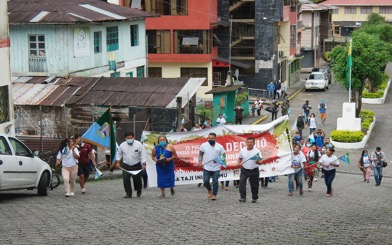This case study was written by the Shuar Arutam People (PSHA) in collaboration with Amazon Watch, ICCA Consortium, Fundación Tiam, LluviaComunicación, MiningWatch Canada and Witness (based on personal interviews with Josefina Tunki, president of the PSHA).
The COVID-19 pandemic has been a particularly difficult time for the Shuar Arutam People (PSHA) of the Ecuadorian Amazon in the defense of their territory and their ongoing resistance against large-scale mining. The government and mining companies took advantage of the pandemic to intensify the invasion by extractive industries on multiple fronts.
56% of the territory of the PSHA has been concessioned off by the national government to foreign mining companies without their consent: SolGold (Australia), ExplorCobres S.A. EXSA (China and Canada), Aurania Resources (Canada) and Solaris Resources (Canada). The Canadian company Solaris Resources Inc. arrived in 2019 having acquired the Warintza project through Lowell Mineral Exploration, its subsidiary in Ecuador, in order to exploit copper and molybdenum. Faced with the reactivation of this project the PSHA, which in 2006 had already expelled Lowell, reaffirmed its right to self-determination by declaring ‘PSHA as a territory of life (ICCA)’ in 2019 and launching the international campaign “PSHA has already decided: No to mining.”
Due to its firm opposition to large-scale mining and to companies such as Solaris Resources (a company backed by the national and provincial government), the PSHA has been the victim of a series of abuses by the company, which has sought to divide and intimidate them in order to advance the exploration studies of the Warintza project during the pandemic.
Despite the health emergency, the government has continued to approve mining exploitation in indigenous territories and seeks to suppress social protest through the militarization of territories and police repression. These measures violate the collective rights and the exercise of the right to mobilization and resistance of the PSHA and other indigenous peoples of Ecuador.
The Governing Council of the Shuar Arutam People (CGPSHA) is made up of 47 communities organized into six associations that make up the Shuar Arutam People (PSHA) with a territory of approximately 230,000 hectares. As PSHA says: “We are a population of 12,000 inhabitants. Our people have lived in the Cordillera del Cóndor for thousands of years, it’s where our communities are located, including on the banks and in the valleys of the Zamora, Coangos and Santiago Rivers. Our people are autonomous and ancestral, our grandparents have left us a lot of knowledge, teaching us its great value. The Cordillera del Cóndor is unique, because the headwaters of our rivers are there; our forests and biodiversity originate there. Our sacred places are also located there, as are our lakes, waterfalls and caves, which also have great tourist potential. In addition, we have our own life plan and regulations” (J. Tunki, Personal communication, September 9, 2021).
...
Read the full case study here.
In addition, the resistance of the PSHA in the face of mining during the COVID-19 pandemic is highlighted in the Latin America report, "No Reprieve: For life and territory, COVID-19 and the mining pandemic." See the full report here.
